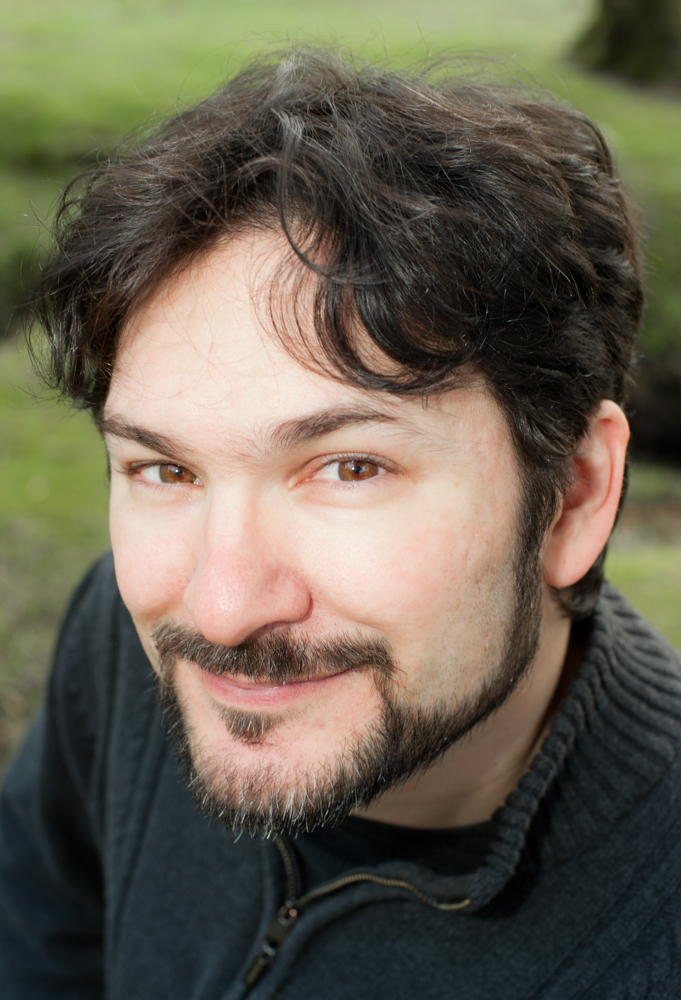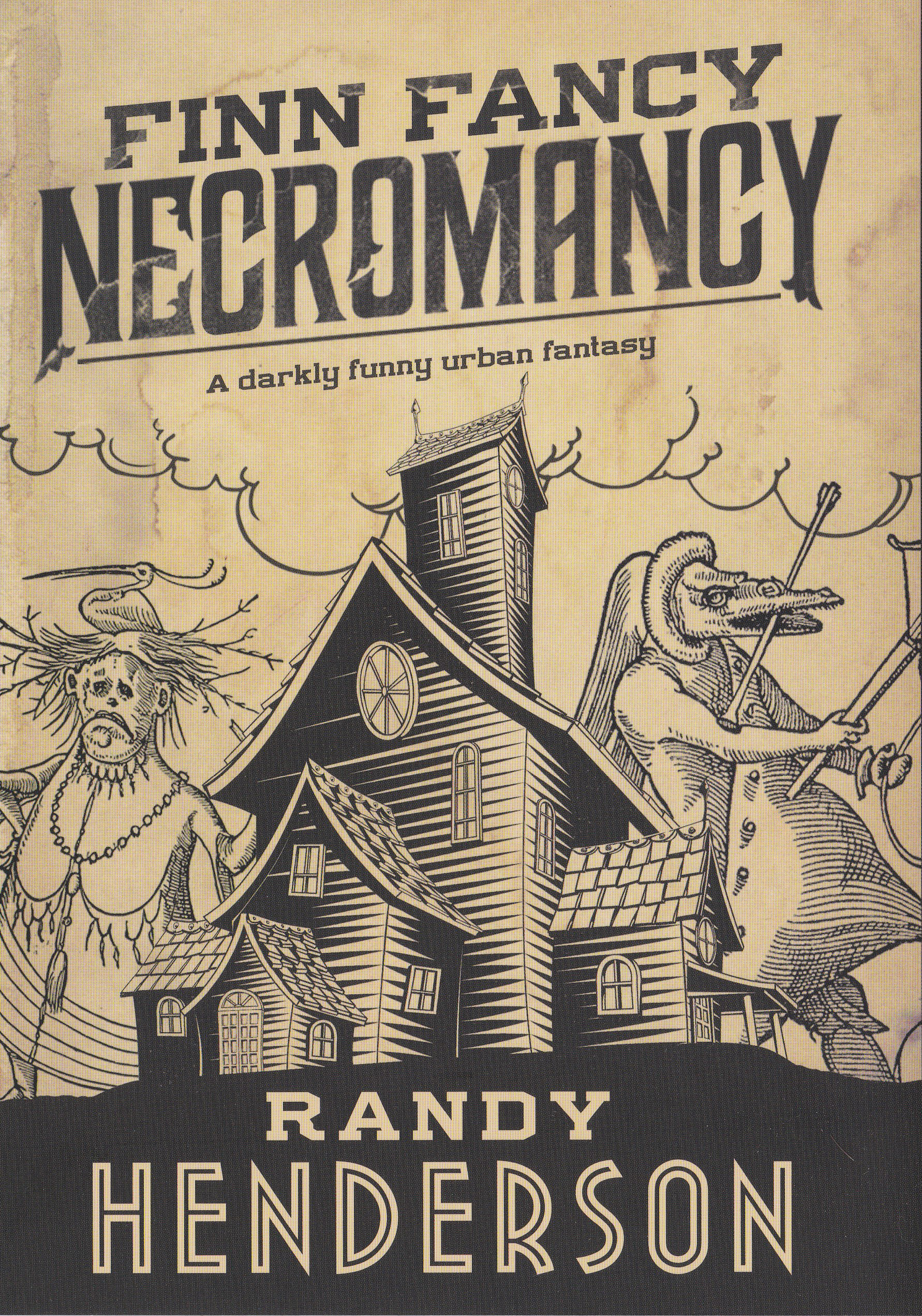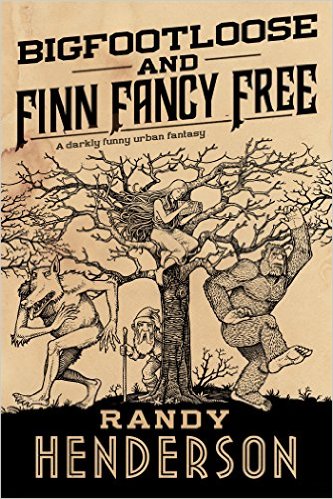Like most people I think, I read by both taste and mood. Sort of like how I eat. Or make lo — uh, make the food I eat.
While I enjoy dark fantasy and so-called “grimdark” (official term and sponsor of the 2000’s Stuff Nobody Agrees What the Official Term Should Be For-athon), it feels like heavy lifting to me, as it is often filled with a sense of hopelessness, of fear, of pain, etc. that, even when cut with the occasional moment of joy, can still feel draining to read (at least for me). I have to take my dark in small doses, like absinthe, or Carrot Top, or the awareness of my inevitable death.
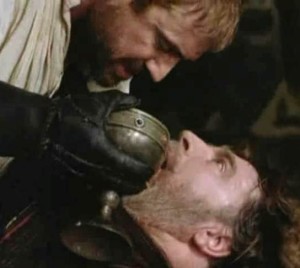
Swallow My Darkness!!!
Don’t get me wrong. I think that Shakespeare guy has a real future with those crazy dark tragedies of his. And when done well, “grimdark” can be satisfying reading in the sense that you feel these complex and sometimes uncomfortable emotions evoked by the work, and feel rewarded for that heavy lifting. It also is able to explore deep and difficult themes and subjects in a more focused way than other fantasy, topics such as the darker side of human nature, moral ambiguity, torture, the origins of cruelty, etc.
In the words of that wise bard Trent Reznor, “I hurt myself today, to see if I still feel.”
But what drew me personally into fantasy to begin with was (mostly) not exploring the dark or raw side of humanity and reality, it was escaping into magical worlds, and being filled with a sense of wonder. Granted, Thomas Covenant and Lord of the Rings are not entirely happy happy joy joy, but even they had a sense that around every corner the character would find something magical and wondrous. Yet in a lot of today’s darker, grittier fantasy, in trying to feel uber-“real,” the simple fun and wonder of it all gets buried under the blood and mud.
The trend toward the dark is understandable, and very visible. We went from Christopher Reeves to “Man of Steel,” from “Meh-wige, that bwessed awangement” to the Red Wedding. Certainly, we live in the age shaped by September 11th, war, and the Great Recession, by looming environmental collapse, news media that profits on fear and anger, and a broken political system that does the same It’s freaking depressing, and makes folks cynical and angry. And that has seeped into our consciousness in all kinds of ways, and thus into our entertainment.
Finn Fancy Necromancy was written because I’d just finished writing a couple of dark, gritty (and not great) novels that required a lot of research and heavy lifting to write, and I was burned out on it. I just wanted to have some fun, to play with magic, to have some laughs, and spend time in places and on subjects I loved. I think that is a large part of why it was successful. That, and my sacrifices to the dark gods, of course. So, a bit of irony there, perhaps.
In the sequel “Bigfootloose and Finn Fancy Free,” though, I got a bit darker and grittier again. Part of that was a reflection of what was going on in my life at the time. Part of that was me reacting to reader requests to explore the world and the characters deeper. And I think part of it was my natural tendency to want to throw my characters into physical and emotional peril and hardship so that they have real challenges to overcome. Don’t get me wrong, there’s still lots of humor, and romance, and adventure, but the “dark” part of the “dark and quirky” label the Finn Fancy series has been given was a little bit darker this time.
Yet I’m writing book 3 right now, and I’ve definitely swung back more toward the fun and funny again. The humor, the sense of wonder and magic — I need it. I want it. I love it.
Maybe it has a little to do with how we cope in general. When life is feeling crappy or heavy, you can try to make yourself feel better by A) reminding yourself that other people have it worse, and perhaps even engaging in a bit of schadenfreude, or B) you can focus on the positives in your life and try to lighten the mood, to have a laugh, to appreciate all the wonder and beauty around you.
I guess what we seek in fiction at any time can be a bit like that too, depending on our mood (and perhaps how many fucks we have to give at the time — hmmm, I wonder, if Amazon had a “fucks to give” rating, would that help people pick what they are in the mood to read? Note to self: send genius proposal 1,879 to Bezos. And send follow up queries on the other 1,878 proposals).
I suppose a final element of the “grimdark” trend too is the “chasing what’s selling” temptation. While many authors clearly write “dark and gritty” fantasy because it is their genuine passion (George R. R. Martin, Scott Lynch, N. K. Jemisin, Joe Abercrombie, Nnedi Okorafor, Mark Lawrence, and Django Wexler for example), some emerging authors no doubt looked at how zombies and Game of Thrones were popular and making bank, and were tempted to emulate that perceived path to success even if it wasn’t their natural preference.
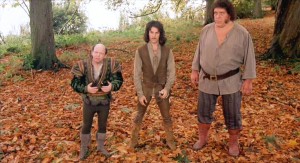
A graphical representation of the rising trend in lighthearted fantasy
Who knows. Maybe now that we’ve collectively poked at our emotional and psychological bruises to examine the pain, we’re ready to brush ourselves off and start dreaming of happier, more magical worlds again — not to avoid reality, but to help sustain our spirits as we fight for a better reality. Perhaps we’ve swung back around to actually craving that again.
And probably, all of that is moot anyway. Readers read what makes them happy. Sometimes it is a blood-covered orgy, sometimes it is a wisecracking fairy. Sometimes it is a blood-covered orgy with wisecracking fairies. There will always be readers for both, and for neither.


